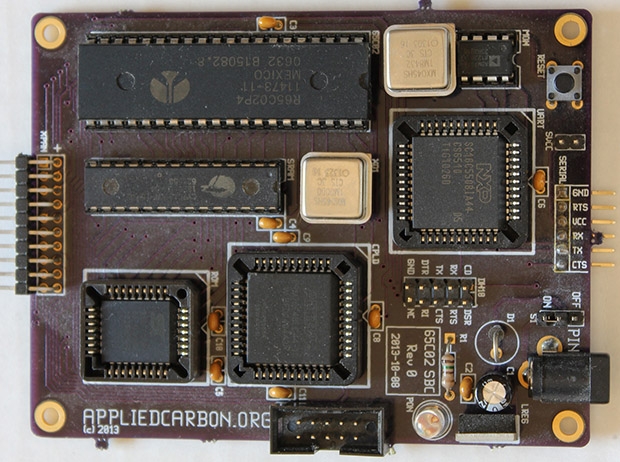
Robots have always been a wonderful tool for learning electronics, but if you compare the robot kits from today against the robot kits from the 80s and early 90s, there’s a marked difference. There are fairly powerful microcontrollers in the new ones, and you program them in languages, and not straight machine code. Given this community’s propensity to say, ‘you could have just used a 555,’ this is obviously a problem.
[Carbon]’s entry for The Hackaday Prize is a great retro callback to the Heathkit HERO and robotic arms you can now find tucked away on a shelf in the electronics lab of every major educational institution. It’s a 65C02 single board computer, designed with robotics in mind.
The 6502 board is just what you would expect; a CPU, RAM, ROM, CPLD glue, and a serial port. The second board down on the stack is rather interesting – it’s a dual channel servo board made entirely out of discrete logic. The final board in the stack is an 8-channel ADC meant for a Pololu reflective sensor, making this 6502 in a Boe-bot chassis a proper line-following robot, coded in 6502 assembly.
[Carbon]’s video of his bot below.
![]() The project featured in this post is an entry in The Hackaday Prize. Build something awesome and win a trip to space or hundreds of other prizes.
The project featured in this post is an entry in The Hackaday Prize. Build something awesome and win a trip to space or hundreds of other prizes.
https://www.youtube.com/watch?v=S5xz5AuFySE















That’s nice, but they could have just used a 555.
There, I said it.
Your comment only counts if you provide evidence… http://rookieelectronics.com/lfr-using-555-timer/
One– there’s a reply button. You should use it. Two– it’s very, very obviously a joke.
Actually, it was meant as more of a deterrent to trolling. Sort of a “There’s the wind out of your sails” preemptive thing.
Fun article though, kind of reminiscent of beambots. :o)
dsblackout – Chill… my …not quite a reply… was intended in the same vein as icanhazadd … besides using a 6502 has the advantage over a 555 of letting you play Für Elise in a chiptunes warble while following the line. It sounds like a fun project, a neat platform for tuning your 6502 assembler skills.
What’s with the fanaticism over 6502s? They’re slow and crappie.
mmmm… I love opiates too. They make me kinda slow though. I’m guessing you were born sometime after 1990 or so. 6502 was many peoples intro to writing some assembly code and learning what hardware really is. Most people today will never know that joy of discovery. It is all about context heroin worshiper.
Some of us used better processors from that time. Like the 6800 family, my favorite being the 6809. While I initially learned on the 6502 (Atari 800) I really learned when I started using 6809 with OS9.
Not really the point I was trying to make, but I’ll up you one from around the same time… how about adding one more 0. My favorite processor to write in assembly for was the 68000 hands down. I moved from the 6502 in the early 80’s to Amiga in late 80’s. Watch these videos for some context of what the Amiga experience was like for those involved back then.
https://www.youtube.com/watch?v=VCREhVvHXL4&index=3&list=PLB764D77DBE3EF9A9
Then search for things like “amiga 4k demo scene” to see what people are up to still to this day.
Was really magic back then. hard to explain now.
Back then, though, the Amiga cost an arm and a leg for most people; it wasn’t in the same class price or performance-wise as other lower-cost home computers (mainly because the 16-bit 68k “aircraft carrier” CPU was pretty pricey back then).
Actually the Amiga was more expensive than the Atari and Commodore 8 bit machines but they where less expensive than PCs and even the Apple IIs of the time.
They bring memories to those of us who lived that era. That’s the whole point of using something outdated like a 6502 or a Z80, a turntable, a Telecaster, a Wolkswagen Beetle, etc.
Luckily I’ll be dead 40 years from now when today youngsters looking at an old Android phone will recall those old days when men were men and true programmers coded in Java:^)
Hah!
I wonder if, when the 555 was invented, a mechanical engineer said why bother when it could be implemented with a cam?
+1!
That’s probably all they’ll be able to do – “look at it”. It’s currently unclear whether it will actually turn on (or if it does – let’s out the magic smoke) – thanks to RoHS and lead-free solder (ie – tin whiskers).
Even if it did boot – will Google be available? Will any of the apps work? Will the servers those apps connected to still be around? If they are around, will they speak the old protocol?
I can almost guarantee you, though – that in 40 years from now you could probably still boot up any 1980s era microcomputer and use it. Some of the floppies might even still work, too…
That board is ridiculously dusty.
Sitting on a shelf for a year per the date stamp?
I think in this case I’d have to say you could have just used an Arduino.